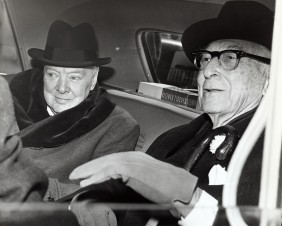On 16 April 1947, the financier and presidential adviser Bernard Baruch said “Let us not be deceived; we are today in the midst of a Cold War. Our enemies are to be found abroad and at home. Let us never forget this: Our unrest is the heart of their success.”
The expression “cold war” was first used in the 1320s by the grandson of a Castilian king, to describe Christian and Islamic tensions in the peninsula. Although not quite. The original Spanish was “la guera tivia”, or the tepid war, but the translator sensibly changed it to “la guera fria”.
In 1946, Baruch’s close friend Winston Churchill told his audience at Fulton, Missouri that “From Stettin in the Baltic to Trieste in the Adriatic, an iron curtain has descended across the continent.” The speech, advertised as “Sinews of Peace”, suitably took place at Westminster College.
Incidentally, Churchill was not the first to use the expression and it was not the first time he used it. Most recent scholarship dates it to Martin Luther.
With typical invective styled “Dr. Martin Luther’s answer to the superchristian, superspiritual, and superlearned book of Goat Emser of Leipzig with a glance at his comrade Murner Goat, Butt Me Not”, Luther manages a typically elegant comment on Paul’s assertion at 2 Corinthians 3:6 that “the letter killeth, but the spirit giveth light”:
By the letter no one can abide in the presence of His wrath, by the spirit no one can perish in the presence of His grace. O what an abundance of riches is here! One could go on speaking about it forever, and yet the pope and the precepts of men have hidden it and fastened an iron curtain before it, that it cries to heaven. Amen.
